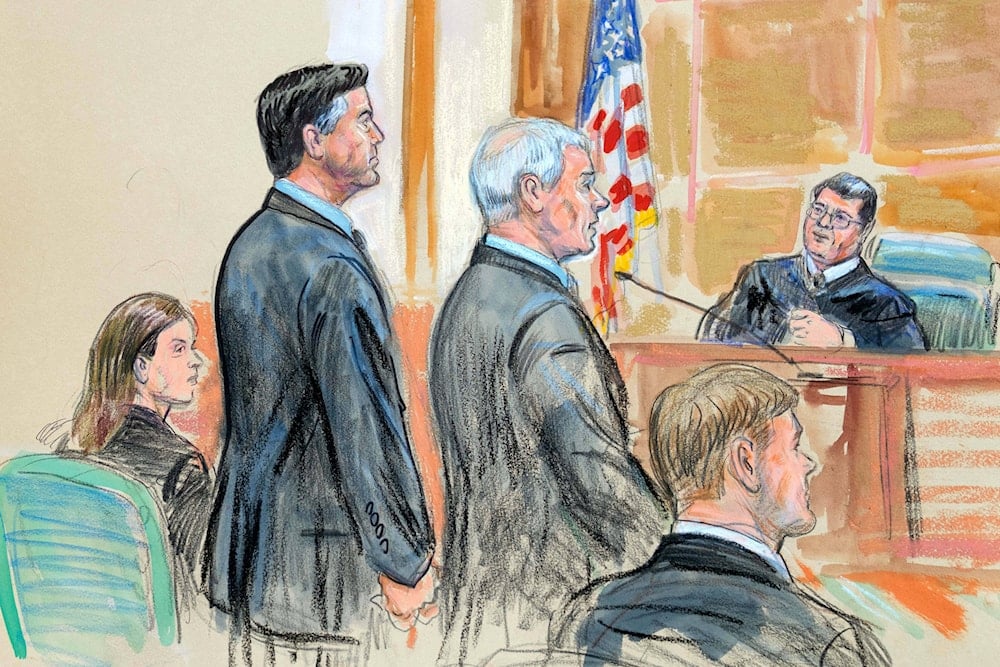Judge finds misconduct in ex-FBI Chief James Comey case
A federal judge found misconduct in how Trump-appointed prosecutor Lindsey Halligan secured charges against James Comey, ordering the release of grand jury records.
-

This courtroom sketch depicts former FBI Director James Comey, second from left, and his attorneys Jessica Carmichael, seated left, and Patrick J. Fitzgerald, standing right, during his arraignment at the federal courthouse in Alexandria, Virginia, on October 8, 2025. (AP)
A US federal judge has found evidence of prosecutorial misconduct in the case against former FBI Director James Comey, ordering that grand jury materials be handed over to his defense team.
US Magistrate Judge William Fitzpatrick, presiding in Alexandria, Virginia, ruled on Monday that Lindsey Halligan, a Trump-appointed federal prosecutor, may have made serious legal errors during grand jury proceedings that led to Comey's indictment. The judge described a "disturbing pattern" of investigative missteps that could have compromised the integrity of the case.
"The record points to a disturbing pattern of profound investigative missteps, missteps that led an FBI agent and a prosecutor to potentially undermine the integrity of the grand jury proceeding," Fitzpatrick stated in his decision.
Fitzpatrick granted what he called an "extraordinary remedy" by ordering the release of grand jury materials to Comey’s legal team, citing "unique circumstances" that warranted the move.
Fitzpatrick criticizes legal missteps by Trump-appointed prosecutor
Halligan, who was appointed by Trump in September despite having no prior experience as a federal prosecutor, is accused of mismanaging key elements of the case. Her background was primarily in real estate law, and she had previously represented Trump in civil matters.
According to the ruling, Halligan made legally questionable statements to the grand jury that may have infringed upon Comey’s rights. Fitzpatrick also noted concerns over the use of evidence obtained without a new warrant and the testimony of an FBI agent who had access to potentially privileged materials.
A Justice Department spokesperson declined to comment on the ruling. Prosecutors responded by requesting a pause on the order and argued in court filings that the judge "may have misinterpreted some facts."
Later on Monday, US District Judge Michael Nachmanoff, overseeing Comey’s case, temporarily halted the order and agreed to review the magistrate’s findings.
Grand jury records are typically protected by strict confidentiality rules. However, Fitzpatrick ruled that the defense had shown a specific and credible need for access. "The Court finds the record in this case requires the full disclosure of grand jury materials," Fitzpatrick wrote.
"In so finding, the Court recognizes this is an extraordinary remedy, but given the factually based challenges the defense has raised to the government's conduct and the prospect that government misconduct may have tainted the grand jury proceedings, disclosure of grand jury materials under these unique circumstances is necessary to fully protect the rights of the accused."
Comey’s defense cites political motivations behind prosecution
Comey has pleaded not guilty to charges filed in September, including making false statements and obstructing a congressional investigation. His defense has argued that the charges stem from Trump's personal animosity toward him, particularly over Comey's leadership of the investigation into alleged contacts between Trump’s 2016 campaign and Russian individuals.
Prosecutors allege that he misled a Senate committee in 2020 when he affirmed earlier testimony claiming he had not authorized FBI personnel to anonymously speak to the media regarding investigations into Trump and Hillary Clinton.
Fitzpatrick’s ruling identified several investigative failures, including revisiting old FBI evidence without a renewed warrant and permitting testimony from an agent exposed to attorney-client privileged material. As the case proceeds, Judge Nachmanoff’s forthcoming decision on whether to uphold or overturn Fitzpatrick’s order will likely influence how the charges against Comey are handled moving forward.

 4 Min Read
4 Min Read










